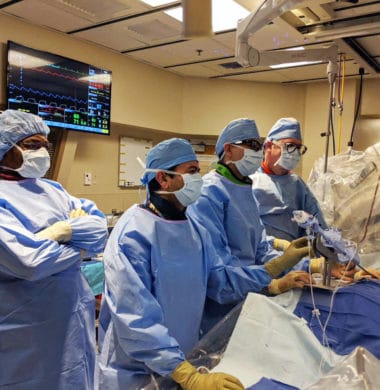Types of Mitral Valve Replacement Options

Getting the news that you need a Mitral or Aortic valve replacement can be a little scary, but the good news is you have options. Maybe you have an idea of what you’d like to do but want a little more information, or maybe you’re entirely clueless and are looking for a little information before you dive too deeply into the discussion with your doctor. Whatever the case may be, it helps to know more about your options before you make a decision. We’re laying out some of the most common options for this replacement below so you can go into the decision-making process with your doctor well informed.
MitraClip
 For patients suffering from mitral regurgitation who are ineligible for a valve replacement, the MitraClip procedure is a less-invasive way of treating the problem and getting you back to life. As with any newer or more experimental procedure, there are of course risks involved, and you should discuss these risks in-depth with your doctors before choosing this. In general, this procedure should only be used in patients with significant, degenerative mitral regurgitation where traditional valve replacement is not an option. This therapy is intended to reduce mitral regurgitation, but if it does not reduce it enough, quality of life may not improve as intended. (Image courtesy of Abbott)
For patients suffering from mitral regurgitation who are ineligible for a valve replacement, the MitraClip procedure is a less-invasive way of treating the problem and getting you back to life. As with any newer or more experimental procedure, there are of course risks involved, and you should discuss these risks in-depth with your doctors before choosing this. In general, this procedure should only be used in patients with significant, degenerative mitral regurgitation where traditional valve replacement is not an option. This therapy is intended to reduce mitral regurgitation, but if it does not reduce it enough, quality of life may not improve as intended. (Image courtesy of Abbott)
Watch this video to see what SDCA’s top Docs are doing with the MitraClip procedure.
Tissue Valve
For patients where valve replacement is a viable option, there are still decisions to be made. Tissue valves can be created using human or animal donor tissue. These replacements typically last 10-20 years without the need for long-term medication after the fact. If a young person is receiving a tissue valve replacement, the likelihood of them requiring another surgery later in life is fairly high.
Mechanical Valve
This is the longest-lasting of the valve replacement options. Because the valve in this procedure is made from durable materials, a mechanical valve replacement can last for the remainder of a patients’ life. However, as with any major procedure, there are potential drawbacks. For most patients, a blood-thinning medication is required for the remainder of the patients’ lives after a mechanical valve replacement, to keep clots from forming. This is a critical precaution because clots can cause the mechanical valve to malfunction, or can become an embolism (traveling clot) and lead to potentially fatal instances such as a heart attack or stroke, depending on where the clot chooses to lodge once it begins traveling through the bloodstream.
At the end of the day, there is plenty to consider for each option, and the specifics of your particular case will be the main driver in determining which choice provides the best prognosis for you and your quality of life post-surgery. Working closely with a team of doctors who knows your medical history well and understands your lifestyle needs, desires, and goals is key. Combined with the expert knowledge required to help make a decision that will bring you closest to achieving those lifestyle goals, the heart doctors at South Denver Cardiology is ready to help you make the valve replacement choice that makes the most sense for you.
- Can I Shovel Snow with a Heart Condition? - March 18, 2024
- 6 Tips for Resuming Outdoor Exercise this Spring - March 11, 2024
- Early Signs of Heart Disease - February 26, 2024
Sign Up
As with any health concerns, your specific treatment program should be discussed thoroughly with your primary care physician as well as any specialists who may need to be consulted – like a cardiologist.
Sign Up
